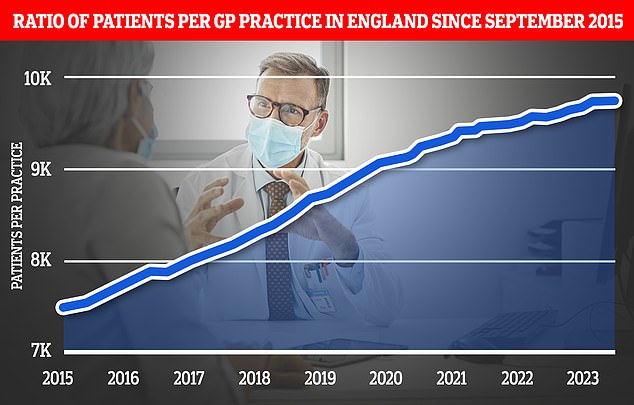Patients are put at risk by remote GP consultations, major study finds, especially elderly
Online and telephone GP appointments can miss serious illnesses and put patients at risk of fatal mistakes, a major study has found.
Older people and others with urgent conditions face misdiagnosis and potentially fatal delays in care, which would be less likely if they were seen face-to-face, analysis suggests.
Poor rapport building and inadequate information gathering means patients are at greater risk of underdiagnosis or incorrect treatment, they found.
Those with communication problems – namely the elderly and the very young – are most at risk and should always be offered face-to-face appointments when requested, researchers suggest.
A team from Oxford University, Plymouth and the Nuffield Trust examined data from 95 UK safety incidents between 2020 and 2023, including complaints, reports and settled compensation claims.
Researchers from Oxford say remote consultations risk under-diagnosing patients, GPs being influenced by what has been said before and less qualified staff failing to respond to signs of illness. Pictured: Virtual appointment inventory

The graph shows the ratio between GP patients and practices. The latest data from NHS England shows there is an average of 9,740 patients per operation
In several safety incidents, doctors assumed that a diagnosis made during a remote consultation was final rather than provisional.
Serious errors – including some fatalities – involving serious conditions such as sepsis, congenital heart disease, cancer and diabetic foot complications “could likely be easily diagnosed with an in-person examination,” they said.
‘Particularly when subsequent consultations took place remotely, such errors could become entrenched, leading to diagnostic overshadowing and missed or delayed diagnoses.’
In one case, a 16-year-old girl died of sepsis after a GP spoke to her older sister on the phone and incorrectly diagnosed glandular fever.
Another involved a woman in her 70s who suddenly became short of breath and was told she would be called back.
But the GP’s receptionist was distracted by a patient in the waiting room and the call was never made, causing the telephone patient to deteriorate and die at home that afternoon.
Elsewhere, NHS 111 workers failed to diagnose a pregnant woman with premature rupture of membranes and instead she was taken off a ‘urinary problems algorithm’.
Other cases involved missed pulmonary embolism in a new mother that led to her death, and missed congenital heart defects in a baby.
In some cases, GPs themselves realized the limitations of remote consultations.
A GP said: ‘I remember a father calling. It really didn’t seem that concerned about it.
“And I was really underplaying it, and when I did a video call, you know, this kid… had an intercostal recession… looked really, really bad. And it was quite scary actually that you had had the conversation and if you had just listened to what Dad said, you probably wouldn’t have worried.”
Researchers said patients with pre-existing conditions were particularly difficult to assess over the phone, especially those who had multiple or were getting worse.
Clinical conditions that were difficult to assess remotely included possible cardiac pain, acute abdomen, breathing difficulties, vague and generalized symptoms, and symptoms that worsened despite treatment.
Researchers found that GP practices were suffering from understaffing and high demand.
The study, published in the BMJ, recommended that doctors ensure the patient knows what the next steps in their care are, while patients should make it clear if they are worsening.
Professor Greenhalgh, lead researcher from the University of Oxford, said: ‘The vast majority of remote clinical consultations in general practices are safe, largely because staff are alert and err on the side of caution.
‘When safety incidents occur, organizational pressure and poor communication often play a major role.
‘This new research has more accurately identified where the risks lie and what measures we can take to further reduce the risks.’
Dr. Rebecca Rosen, author of the study at the Nuffield Trust, said: ‘Remote consulting is here to stay and the research has identified ways to ensure quality and safety.
‘Every doctor should be aware of high-risk symptoms for which it is safer to see patients in person; should listen and respond carefully to patients who say they need an in-person appointment, and consult face-to-face if a patient has not improved from previous remote consultations.
‘We can also ensure patients have the knowledge and tools to help them get the most out of their consultations.’
The latest data for England shows that 71 percent of GP consultations take place face-to-face, while 24 percent take place by telephone.
It comes after suggestions that the NHS is discriminating against older patients, with one in six GP practices now only accepting online bookings.
Dr. Victoria Tzortziou-Brown, vice-president of the Royal College of GPs, said a lot of high-quality, safe remote care is being delivered every day in general practice.
She said: ‘It’s important that GPs and our teams can offer patients access to our services in a variety of ways, and while many patients prefer to see their GP in person, many appreciate the convenience that remote consultation offers.
‘The Board’s position is that the method of consultation should be a shared decision between doctor and patient, based on clinical need, and it is clear that remote consultations will be more suitable for some patients than others.
‘While there are risks associated with all medical consultations, delivering care remotely poses specific challenges and limitations, as highlighted by this study. It makes a number of useful recommendations in relation to identifying patients for whom remote care may not be suitable and supporting GP teams to ensure that remote consultations are delivered as safely as possible.’
